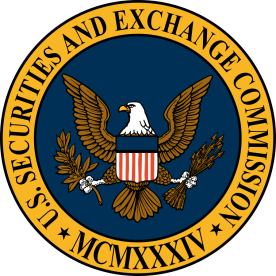On December 9, 2020, the U.S. Securities and Exchange Commission (“SEC”) in Release No. 5643 under the Investment Advisers Act of 1940 (the “Advisers Act”) announced the institution of an enforcement action against ICE Data Pricing & Reference Data, LLC (“PRD”) and simultaneously the settlement by PRD in which PRD was ordered to cease and desist from violative activity, was censured and was ordered to pay a civil penalty of $8,000,000. PRD is an investment adviser registered with the SEC under the Advisers Act.
ICE Data Pricing & Reference Data, LLC
PRD is also a wholly-owned subsidiary of Intercontinental Exchange, Inc. (“ICE”), a public company whose securities are listed on the New York Stock Exchange. ICE owns and operates 12 global stock and commodities exchanges and clearing houses, including the New York Stock Exchange, NYSE EuroNext, and the ICE futures exchanges in the United States, Canada, and Europe. ICE also operates the Liffe future exchanges in Europe, equity option exchanges, and the OTC energy, credit and equity markets in the United States, Canada, and Europe. Six central clearing houses are also owned and operated by ICE: ICE Clear U.S., ICE Clear Europe, ICE Clear Singapore, ICE Clear Credit, ICE Clear Netherlands, and ICE NGX. Hence, it may fairly be said that ICE is a financial market behemoth.
PRD is an internal service affiliate of ICE. It provides institutions, investment funds, and other financial services customers with global securities pricing, evaluations, and other analytics, especially pricing information for almost 2.8 million fixed income securities. The SEC observed that for approximately 46,000 securities, PRD had insufficient information to provide an evaluation of the security and was forced to rely on a single-broker quoted price. The SEC found that from at least 2015 through June 2019, PRD provided these quotes as PRD evaluations, without disclosing the limited basis for that pricing information. As a result, the market pricing system was compromised. In one example cited by the SEC, PRD posted an unchanging price on a mortgage-related interest-only security for over 18 months, based on a single-broker quote. In response to an enforcement action brought by the SEC, that broker was found by a Federal Court to have knowingly falsely inflated the price of that security. In July 2019, PRD ceased using single-broker quotes except for index-linked securities and ceased the use of single-broker quotes entirely on September 30, 2020.
The enforcement settlement with PRD made ICE ineligible to avail itself of the enhanced access to the securities markets (including utilizing automatic shelf registrations) under SEC Rule 405 under the 33 Act as a “well-known seasoned issuer,” unless ICE obtained a waiver from the SEC. In the request for a waiver submitted to the SEC by ICE counsel, it is noted that ICE relied on its status as a “well-known seasoned issuer” to issue some $14 billion in securities between 2015 and September 2020. The waiver was granted, but the risk to ICE from the inattention at its service affiliate underscores how important identifying and managing market risks are, even at the most-sophisticated capital market participants.
Prudential Financial, Inc.
Then on Wednesday, December 23, 2020, the SEC launched another slingshot at a financial “Goliath,” Prudential Financial, Inc. The company was founded in New Jersey in 1873 as The Widows and Orphans Friendly Society to provide insurance that would pay the cost of burials. The company changed its name to The Prudential Friendly Society two years later, and then to Prudential Insurance Company two years after that. Its founder, John F. Dryden, later became a U. S. Senator, and the company has long had very close relations with the New Jersey government. Indeed, so long as Prudential Insurance was a mutual insurance company (i.e., owned by its policyholders) with over $10 million in assets, a provision in the New Jersey insurance law empowered the Chief Justice of the New Jersey Supreme Court to designate 25% of the insurer’s Directors, both to emphasize the public obligations of that company, and to maintain that close “public-private” relationship. That statutory provision no longer applied to Prudential once it demutualized in 2001 and became a publicly owned corporation, Prudential Financial, Inc. (“Prudential”), whose stock is traded on the New York Stock Exchange.
Prudential is the largest insurance company in the United States, and is also one of America’s largest diversified financial firms, providing annuities, mutual funds, pension-and-retirement related investments, administration, asset management, and brokerage services, in addition to selling life insurance. Prudential has over $1.6 trillion in assets under management according to the company and has over $4 trillion in life insurance outstanding. The Financial Stability Oversight Council, created under the 2010 Dodd-Frank Act sought to have Prudential designated as a Systemically Important Financial Institution due to its size, even though it is not a bank and does not have any federal insurance against loss. That effort did not succeed, but the effort underscores something of the “giant” scope of the firm.
One of Prudential’s indirect, wholly-owned subsidiaries, Pruco Securities, LLC (“Pruco”), is an investment adviser registered with the SEC under the Advisers Act. Pruco offers money management services including asset management and trade execution. One suite of services is a “wrap-fee” program, where clients paid an all-inclusive fee for several services. The SEC initiated an enforcement proceeding on December 23, 2020, against Pruco asserting that since 2014 Pruco had breached its fiduciary duty to wrap fee clients by:
-
Failing to conduct promised monitoring of accounts to confirm the continuing suitability of the program
-
Charging fees higher than disclosed
-
Recommending the purchase of higher fee products to clients
-
Failing to disclose Pruco’s receipt of payments from a clearing firm for sending it business
-
Recommending bank sweep vehicles, where Pruco received a fee
-
Failing to get best execution by recommending mutual funds shares with higher costs, where Pruco received higher fees
Pruco agreed to a settlement that day under which Pruco was ordered to cease and desist from future violations and censured. Pruco was also ordered to disgorge almost $12.7 million-plus prejudgment interest of over $3 million; and also to pay a civil penalty of $2.5 million. The order also requires Pruco to review and revise its wrap-fee programs and related policies and procedures to enhance compliance, to evaluate each client for possible relocation to lower-cost programs, to notify within 30 days each affected investor of the settlement terms, and to certify in writing within 45 days compliance with the order “in a narrative supported by exhibits.”
This is unfortunately not the first time that Prudential has proven to have belied its name. In 1993, the SEC brought an enforcement action against Prudential’s then subsidiary, Prudential Securities Incorporated for selling over $8 billion of fraudulent tax shelters to thousands of unsuspecting investors, paying $330 million to investors and $41 million in fines. It was at that time the largest securities fraud case ever brought by the SEC. Subsequently Prudential has had to settle claims with state insurance regulators that it had churned life insurance policies, resulting in over $2 billion in refunds and $35 million in fines. More recently, Prudential entered into a settlement with the SEC related to the sale of annuity products that it acquired when it purchased American Skandia Investment Services, Inc., in 2003. Then in 2009, a Prudential unit settled charges of failure to disclose conflicts of interest related to 94 Prudential Series Funds offered through AST Investment Services, Inc., involving:
-
The recall of securities on loans
-
Related misleading disclosures
-
A failure to reimburse the Funds for higher taxes in certain foreign jurisdictions
Despite this record, Prudential as a “well-known seasoned issuer” that had already received a waiver with respect to the AST enforcement settlement, once again sought relief from the SEC. Counsel for Prudential noted in its waiver request letter of December 21, 2020 (clearly written in anticipation of Pruco’s December 23 settlement), that Prudential had utilized the expedited offering ability it enjoyed to issue approximately $13.7 billion in securities since January 2014, including $1.5 billion in March 2020 and $1.3 billion in August to maintain its financial strength in the face of the COVID-19 pandemic. That waiver has been granted, more as a reflection of the financial significance of Prudential than as a recognition of any particular “prudence” at the company.
ICE and Prudential SEC Enforcement
These two SEC enforcement actions reflect disturbing aspects of the capital markets: negligent behavior at ICE arising from a failure to recognize vulnerabilities and timely to address them; and at Prudential, a recurring emphasis on economic return to the detriment of clients – who had the imprudence to seek “a piece of the Rock.” Perhaps it is time to arm the SEC with a bigger “slingshot.”




 />i
/>i
